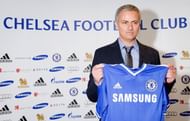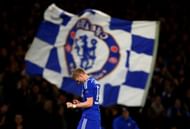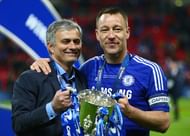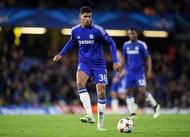Love him or Hate him José Mário dos Santos Mourinho is certainly not someone you can ignore.
Mourinho became the first manager in history to win every domestic title (League title, Domestic cup, Super cup, and League cup) in four European leagues after winning La Liga, a Super Cup and King’s Cup with Real Madrid. His tenure in Madrid though, was anything but successful, having been outclassed by Guardiola’s Barcelona and on some occasions by Atletico Madrid, the air of invincibility around the Special One had started to fade.
The dropping of Club captain Iker Casillas did not help either and only led to more pressure from the fans and the press. After failing to win the Champions League and various public confrontations with influential members of the squad and the media, his position at Madrid became untenable. Though he still enjoyed the support of the president, Mourinho had lost the respect of his squad and the results began to wane.
A personally unexpected snub to succeed Sir Alex Ferguson at Old Trafford followed which was reportedly because of his short term style of working and controversial nature. He needed a place he could call home and where he was trusted and loved by the fans where he could rebuild his reputation.
After winning the Champions League, Chelsea invested heavily, acquiring a host of fleet-footed attacking talent. The triumvirate of Mata, Oscar, and Hazard was exciting and on its day was capable of running rings around any defence. They were capable of playing fast, possession-based football the owner wanted at Stamford Bridge which many a manager had failed to deliver.
The team though had lost the know-how to grind out a result and convert those losses into draws and draws into wins. A task tailor-made for Jose Mourinho.
At the time of his presentation as the new Chelsea manager, Mourinho or the “Happy One” as he insisted on being called claimed to be a changed man. He talked about building a side for the future. A team who had a clear defined approach of play; A team who could develop together similar to the lines of his erstwhile rivals Barcelona. He certainly looked like a man on a mission, someone who wanted to right the wrongs and turn over to a new leaf.
But what was he trying to establish? A covert bid to prove to Ferguson that he had it in him to build a dynasty? One thing you can be sure of is that, with Jose, no one can know anything for sure!
Tactical Upheaval:
One of the first things Mourinho did on his return was to make the wobbly Chelsea backline watertight. A deeper defensive line was adopted to negate the lack of pace of his captain. Terry repaid his manager’s faith by putting in great defensive performances and an occasional headed goal. (not to discount the massive psychological boost of having him in the team has on his teammates).
Nemanja Matic, a former Chelsea youth was re-signed and seamlessly slotted into a Claude Makelele sized hole left at the base of Chelsea’s midfield for a long time. This added the bite and steel to the team a base for the attackers to build on.
Jose demanded that Oscar and Hazard track back apart from their attacking duties. Though the demand was justified, purists would question the wisdom behind this demand. Their attacking prowess was the reason they were in the team and it made no sense to have them defend.
However, foresight shows that it has definitely made Hazard (one episode apart, one of the most willing disciples of his manager) a more complete player and capable of creating a larger impact on the match altogether.
Transfer Policy:
Willian and Andre Schurrle were amongst those brought in, reinforcing the well-equipped attacking midfield further. Mata, arguably Chelsea’s chief creator over the past two seasons was relegated to the bench as he lacked the requisite defensive discipline which Mourinho wanted to blood in his entire squad.
Belgian sensations Kevin De Bruyne and Romelu Lukaku who Mourinho had tipped to play a part in the first team after impressive loan spells at Wolfsburg and West Brom respectively, in the earlier season were both out of the first team before the season well and truly began. Lukaku was farmed out on loan to Everton to make space for a declining Samuel Eto’o while De Bruyne after starting the first match was practically dropped completely from all later fixtures before being sold off to Wolfsburg.
Youth was cast aside and experience was brought in. Mourinho justified this approach by stating he needed people with leadership and experience in his squad to help imbibe in his team of inexperienced stars, the habit of winning.
David Luiz, a fringe player over the past season was offloaded for €50 million. The money was re-invested for the signings of Cesc Fabregas and Diego Costa which helped plug the most obvious gaps in the squad. Didier Drogba was signed to provide the experience and Loic Remy was bought to complete Mourinho’s requisite three striker quota.
Again experience and readymade stars were chosen over youth and though it reaped telling dividends, was it in line with Jose’s promise?
Andre Schurrle was Mourinho’s first signing of his second spell as Chelsea manager. He was signed with high hopes, but due to the nearly non-existent rotation policy Mourinho uses, he never made his mark on the Chelsea squad. The same thing can be said about Demba Ba, Mohamed Salah, Kevin De Bruyne and a duo who are widely tipped to follow them out of the exit door namely Juan Cuadrado and Mohamed Salah. Chelsea has been following a strict one in one out policy currently. But is it really working?
The turnover of players who aren’t even given a fair shot in the first team is increasing at an alarming rate. Are players being looked at as investments made to book profits on much like the stock market?
Rotation or lack of it
Rotation is considered a major part of modern day football. A club has a duty of resting players and keeping them fresh over the course of the season. But the question is, does rotation disrupt the benefits of continuity and having the same squad week in week out? That’s probably what Mourinho believes.
Though known for being pragmatic and changing as per the need of every game, he invariably tends to find a way to adapt to the players at his disposal. Even in matches that are considered to be of reduced importance like the Carling Cup, he preferred to stick to his first choice team. Was it why the performances of the team who was so dominant in the first half of the season, began to decline come mid-season? Where the usually highly entertaining matches started to become drab affairs.
Mourinho’s teams are usually up there fighting it out for the title come the end of the season. So when the lots for the latter stages of the Champions League are drawn, Chelsea usually end up with a tight schedule involving playing a tough opponent in between mid-week clashes of continental football.
So rotating a few of the players would help in improving competition for places and keeping the players on their toes and also maintains fitness of the players and provides opportunities for fringe players like Cuadrado to impress.
Integrating Chelsea’s youth or Loan shark Club?
Chelsea’s youth team has been dominating the junior circles for a couple of years. But none of Chelsea’s young guns have come close to knocking on the first team doors. That may be because of the labyrinth of doors of Chelsea’s complex loan system they have to pass through to be able to stake claim for a first team place like Thibaut Courtois.
Mourinho though, has gone ahead and staked his reputation on coming good on his promise of integrating youth into his first team by saying that he would have failed if players like Ruben Loftus Cheek, Lewis Baker, Isiah Brown and Dominic Solanke fail to make the cut.
A handful of appearances he handed Ruben Loftus Cheek at the fag-end of last season when the title was safely in the bag shows some promise on that end. And although two more of Chelsea’s youth stars got a debut last season namely Dominic Solanke and Isaiah Brown, both of them are set to be loaned out come this season.
Highly rated youngsters like Christensen and Kalas have been sent out on loan again and Chelsea are reportedly trying to sign John Stones from Everton for a fee in the region of £30M. Though it might be argued that Stones has a larger potential than either of Christensen or Kalas but isn’t it worth giving them a try?
The Special One has talked about how age and experience has seen him evolve and become a different manager than he used to be. This still seems like the same short-term formula for instant success he’s applied everywhere. Do you believe he would really come good on his promises? Or is this yet another mind game he is trying to pull on us?




